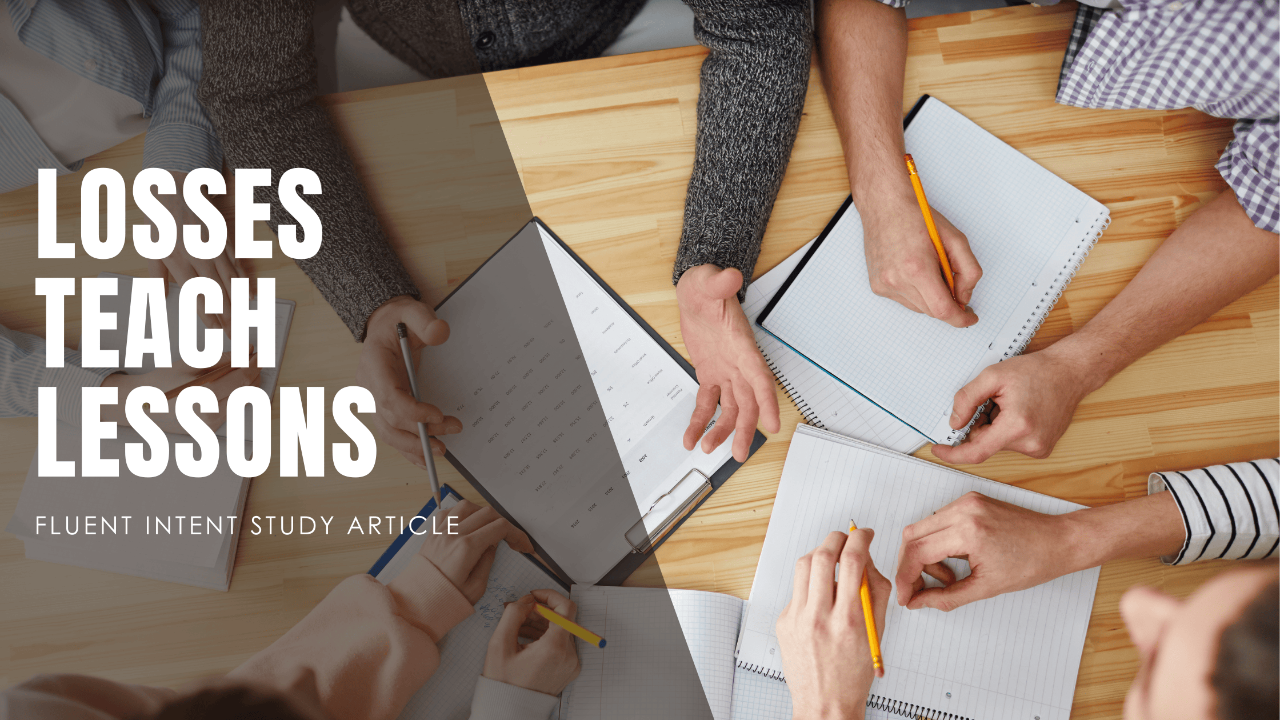English Study Article | Losses Teach Lessons
Nov 10, 2025
Losses Teach Lessons: When Failure Becomes Your Best Teacher
Welcome to Fluent Intent's study articles! This month, we're exploring "Principles" in business, economics, and finance, drawing inspiration from Ray Dalio's Principles and Saifedean Ammous's Principles of Economics.
Each day, you'll discover a new piece connecting timeless ideas to your worldâperfect for sharpening both your English and your business insights.
A Note on Today's Scenario
This article presents a realistic 2025 scenario designed to illustrate key business vocabulary in action. While fictional, it reflects the inevitable setbacks and learning opportunities you've likely encountered in business or personal projects. As you read, consider: What has your most valuable failure taught you?
Power Up Your Business Vocab
Loss /lɔːs/
Definition: The reduction or failure to gain something valuable, such as money, opportunity, or market position
In action: "The product launch loss forced them to reconsider their entire marketing strategy."
Setback /ˈset.bæk/
Definition: An event that delays progress or reverses previous advances
In action: "The regulatory setback pushed their timeline back by six months."
Recover /rɪˈkʌv.ər/
Definition: To regain strength, position, or success after experiencing difficulty
In action: "The company recovered from bankruptcy by focusing on core profitable services."
Pivot /ˈpɪv.ət/
Definition: To fundamentally change direction or strategy in response to new information
In action: "After the initial failure, they pivoted from hardware to software solutions."
Learn the hard way (idiom)
Definition: To gain knowledge through difficult or painful experience rather than instruction
In action: "She learned the hard way that market research beats gut instinct every time."
Back to the drawing board (idiom)
Definition: To start over completely after a failure or rejection
In action: "When customers rejected the design, it was back to the drawing board for the team."
The Story: When Failure Points the Way Forward
Picture this scene: In early 2025, CodeZap, a promising tech startup, learns the hard way about the importance of user testing. After investing $30,000 in marketing their revolutionary productivity app, they watch in horror as launch week brings brutal reviews: "Clunky interface," "Too complicated," "Crashes constantly."
The loss stings more than financially. Founder Maria Santos had quit her corporate job for this venture. Her team of three developers worked unpaid for months. The failed launch doesn't just drain their bank account—it shatters their confidence and triggers industry gossip about "another overhyped startup."
But instead of folding, CodeZap treats the setback as expensive market research. Maria calls an emergency team meeting: "We're going back to the drawing board, but we're not starting blind this time." They dive into every piece of user feedback, analyzing crash reports and identifying the core problems that sabotaged their launch.
The next six months transform everything. Instead of defending their original vision, they pivot based on actual user needs. The clunky interface gets streamlined. Complex features are simplified or eliminated. The app that emerges in September bears little resemblance to the January disaster and that's exactly why it succeeds.
CodeZap 2.0 attracts 10,000 downloads in its first month. More importantly, user ratings jump from 2.1 stars to 4.6 stars. The team recovers not just their initial investment but discovers a sustainable business model they never would have found without experiencing failure first.
Economic theory validates this pattern repeatedly. Friedrich Hayek argued that markets function as discovery mechanisms—failures eliminate inefficient approaches while successes get replicated. CodeZap's expensive loss served this exact function, forcing them to abandon flawed assumptions and discover what actually works.
Ray Dalio's principle of "mistakes are good if you learn from them" applies directly here. The startup's initial failure wasn't a bug in the system—it was a feature that prevented them from scaling a fundamentally flawed product. Better to fail fast and cheap than to succeed slowly with something nobody wants.
For individuals and organizations alike, the lesson is profound: losses hurt in the moment but often redirect efforts toward more viable paths. The companies that recover strongest are typically those that extract maximum learning from minimum failure.
CodeZap didn't just survive their setback—they leveraged it into competitive advantage by becoming genuinely user-focused rather than just claiming to be.
Think About It
For Your Career: What professional "loss" taught you something valuable that success never could have? How did that failure change your approach going forward?
For Your Learning: When have you had to go "back to the drawing board" with a skill or project? What did the failure reveal that you might have missed otherwise?
For Your Industry: How do setbacks and failures drive innovation in your field? What examples can you think of where initial losses led to breakthrough successes?
Dive Deeper
-
Embracing Mistakes in Business: A Guide to Turning Setbacks into Success - Jenna Rainey
-
5 Lessons You Learn From Your Business Mistakes - Entrepreneur
-
The 4 Most Important Lessons from Our Worst Business Mistakes - Startup Grind